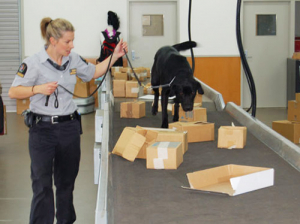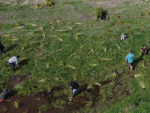The tourism sector appears flippant both on the risk their industry poses through arriving passengers, and the importance of biosecurity, Horticulture New Zealand says.
Yet tourism’s value is mostly based on our unique natural estate, says Richard Palmer, biosecurity and trade policy manager. A breach in biosecurity threatens their livelihood as much as the primary sector’s.
He was submitting this month to Biosecurity 2025, the Ministry for Primary Industries’ (MPI) consultation forum on biosecurity. MPI will now draft the final direction statement based on these submissions and workshops, due to be released later this year.
“Offshore attitudes present a huge challenge and opportunity; how can exporters and visitors quickly and easily grasp the importance of biosecurity to New Zealand?” Palmer asks.
“Our challenge is to provide carrot and stick incentives that compel understanding and compliance. Biosecurity must include social science to identify the human exacerbators of biosecurity risk.”
In addition to steps already proposed, HortNZ suggests:
· Push ads targeting NZ based buyers, on offshore sales websites with NZ rules and practical steps for receiving goods from overseas
· On-arrival, multi-lingual push messaging to visitors’ mobile devices
· Partnership with ports/airports for biosecurity excellence, like Port of Tauranga
· Introducing biosecurity into corporate social responsibility reporting
· Including NZ’s biosecurity context and questionnaire in visa application processes
· Using trusted traveller models to highlight biosecurity exemplars
· Requiring border operators to have a biosecurity risk management plan.
“Developing a NZ sense of biosecurity importance to our businesses, communities and country is a long term challenge – one we’re up for. Other commercial sectors must consider carefully their positions,” HortNZ says.
“The constantly evolving media landscape presents challenges to all key partners in biosecurity to understand and harness, in order to maintain and build strong community biosecurity connections.
“In April the Ministry for Business Innovation and Employment (MBIE) launched a new online visa application process for China visitors to streamline their experience, and thereby enable tourism.
“Whilst MBIE and MPI were in discussion about biosecurity, the failure to include biosecurity information for tourists at the outset underscores the challenge of developing a cohesive team.
“Improving tourist knowledge of our biosecurity context is a simple way to reduce risk at our borders.”
In wide-ranging submissions HortNZ also encouraged the Government to do more to support science, and to assure funding and the funding mechanism.
HortNZ also says the role of bio-control agents (BCAs) and genetic technology requires much exploration, from science and policy perspectives.
“NZ is lagging behind in the policy settings for genetic technology which we must explore urgently to examine the opportunities and risks, and determine how to go forward.”
Palmer says managing biosecurity risk will be much easier when the hurdles to knowledge exchange are removed.
HortNZ has previously noted that whilst many understand the broad opportunity from “big data” we’re not well appraised of the reality.
“Seizing the opportunity will require decision makers to have a much better grasp of what the challenges, real opportunities and risks are from big data and free information exchange. This upskilling must happen quickly.”



















